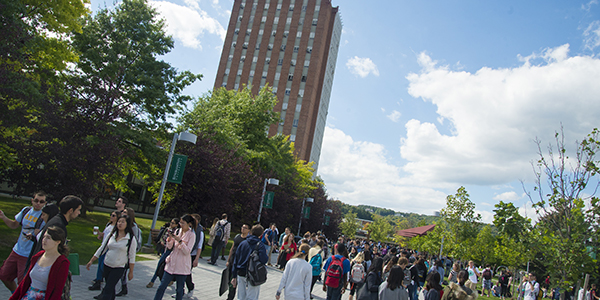Binghamton’s CARES Act funding sends millions to students
University's application results in more than $6 million in direct relief for students

Robert Dalipovic, a 20-year-old Bronx native majoring in psychology, holds down a Federal Work Study job in the Financial Aid and Student Records office — when he’s on campus.
“My first semester at Binghamton University, the first thing I was focused on doing was finding a part-time job that would accommodate my classes,” he said. “Otherwise, staying at Binghamton would have been very difficult.”
Now home due to the COVID-19 pandemic, he’s working a few part-time jobs to help his family with rent and other monthly bills. It’s stressful.
Enter the Coronavirus Aid, Relief and Economic Security (CARES) Act, and Dalipovic, like close to 4,000 other Binghamton students to date, has received some financial relief in the form of a direct grant.
The CARES Act, federal legislation enacted in March, allows higher education institutions to award emergency financial aid grants to students experiencing unexpected expenses and unmet financial need as a result of the pandemic, according to John Cordi, senior associate vice president for budget and business affairs.
“I was able to apply the grant to my expenses,” Dalipovic said. “It has allowed me more access to my wages from the part-time jobs. I can save these funds in order to use them for the upcoming semesters at Binghamton.”
Binghamton University applied for the funds on April 13, the first day applications were open. The funds for students became available June 11.
“It’s grant funding that we had to apply for and is available to all universities,” Cordi said. “There are actually two phases of the CARES Act. Phase 1 is the student portion we’re dealing with now. We received $6.8 million to be used to help students with the fallout from COVID-19.
“The second phase is institutional. This funding will help to reimburse campus for some of the spring refunds that were made to students for student fees, room and board and related pandemic expenses incurred for health and safety and distance learning. We have not received that money yet,” he added.
“This first phase of funding is solely for students in need who were impacted by COVID for things like food or housing. They can use it for a variety of expenses they’ve incurred as a result of the pandemic, including course materials, technology, health, dependent care, transportation, however they deem fit.”
The eligibility for the initial round of student grants was calculated using criteria from the FAFSA including Expected Family Contribution (EFC), size of household and number in college, Cordi said. “The calculated method is the vast majority of the money and over 4,750 students will benefit from that. It was the best way to get the money out the quickest to the most needy students.”
Students not awarded in the initial round will have the opportunity to apply for funds via an application process. These funds will be distributed based on need, so not everyone who applies will receive a grant. The maximum award will be $500.
A smaller portion of the $6.8 million (10% of the funds, or $680,000) will be available and awarded to new FAFSA filers in the fall 2020 semester using the calculated award methodology.
Acknowledgments for the calculated initial round of grants were sent directly to students, asking them if they would like the grant, Cordi said.
“It was unbelievable!” he said. “We had over 3,000 responses the first day — and only one student said they didn’t need it.
“The good news is the money is going out the door, providing immediate assistance to our students.” Cordi added.
Funds are being disbursed as the acknowledgements come in, with $3 million sent to students June 15. As of June 29, more than $5 million had been disbursed to 3,946 students. Undergraduate students are receiving grants ranging in amounts from $750 to no more than $2,500, depending on their individual needs; graduate students receive $750.

